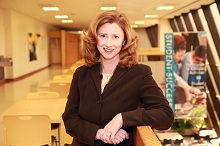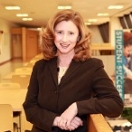

Rebecca Townsend is being honored as a Champion of Change for her time and effort developing innovative ways to help grow and expand the transportation industry.
I am honored to be selected as a Champion of Change. The honor is shared with nearly 100 of my students, who fanned throughout their neighborhoods and did the civic work of facilitating transportation planning deliberation. Together, we worked with community organizations and a regional planning agency to help people share their voices on matters that affect them every day.
Although I’ve been interested in transportation for a while, I learned only recently how difficult it can be for some people to be involved in improving it. My parents raised me to be confident in speaking up. They also valued good discussion and civic practices. When I was in seventh grade in Rhode Island, I would take two city buses to get home. Later, I would use regional buses for social travel. Although I never had a major concern about the system I used, and often took it for granted, I also didn’t realize that others had not had the same positive experiences. When I became an advocate for rail in Springfield, Massachusetts as an engine for economic and environmental benefits, I began to see how my neighbors and friends not only did not have the same experiences, but they did not feel as though speaking up would make a difference.
My experience at the University of Massachusetts and Indiana University confirmed for me the value of communication for productive, civic social interaction and rhetoric and taught me that the ways cultures communicate can make “speaking up” a virtue or a waste of time. I learned about teaching with community service learning, a way of engaging students with the community so that both may benefit. Research shows the difficulties planners have in engaging youth, minorities, and people with low-incomes; this was borne out as I taught at Manchester Community College (MCC) of Connecticut, where I saw students who had both little opportunity for public involvement and little faith in their own voices.
MCC serves an official region of 15 towns and cities east of the Connecticut River and educates 7500 students a year, most of whom request financial assistance. A third of the students are from minority populations. One-quarter are first generation college students. Students stay committed to their communities, however, with an estimated 85% remaining in Connecticut after graduation. As a way to strengthen the connections students already had with their communities, and as a way for planners to receive the valuable involvement and ideas from people in those communities, the Partnership for Inclusive, Cost-Effective Public Participation (PICEP2) (funded by the Federal Transit Administration’s Public Transportation Participation Pilot Program) tested a model of public engagement to determine its effectiveness in reaching traditionally “hard-to-reach” populations. The model involves community college students being taught in Communication and related college courses how to conduct face-to-face deliberative discussions of transportation issues in their own communities to involve people in culturally-sensitive and meaningful ways.
Students worked hard, and they have started something positive. Working in teams they conducted discussions, usually with groups of people that they knew. Their leadership helped to develop trust, eliciting ideas that would otherwise not be voiced. Over 87% of participants had never before contacted the government. Students presented their community research with planners from the Capitol Region Council of Governments and other regional stakeholders. Berlin Pineda led a discussion in Spanish with her church congregation in Hartford, transcribing and translating the project materials, and volunteered to do more. She has graduated and is now an effective teacher of young children. Jonathan Colon worked with a support group for African Americans and Latinos. During the discussion, one person reflected, “A lot of people won’t say how they feel unless they’re asked. They feel like… if they’re heard, nothing’s going to change.” Community service learning awakened a sense of social justice for him, and he has since become MCC’s Student Senate President, with the creation of a bus shelter as one of his platform items. Students have helped bring the voices of the public to the planning agency. And the planners found value in it: since its pilot test, the program was used in a Manchester Transit Enhancement study for the 2012 Knowledge Corridor Sustainability Grant. Cost savings accrued by training and involving students to conduct public engagement as an unpaid academic requirement via ongoing courses, something other colleges are starting to follow.
This project serves and engages many people involved in a variety of areas: transportation, education, civic engagement, and planning. It supports students, youth, minorities, people with low incomes, people who are traditionally under-heard in civic engagement efforts. It has potential to be expanded and adapted in over 1000 community colleges in the US. It helps students see new roles for themselves in civic life. It further develops community college's academic, service, and civic engagement missions. And it promotes the deliberative capacity of Americans to come together and make important changes for themselves and their communities.
Rebecca M. Townsend, Ph.D. teaches communication at Manchester Community College in Connecticut.


